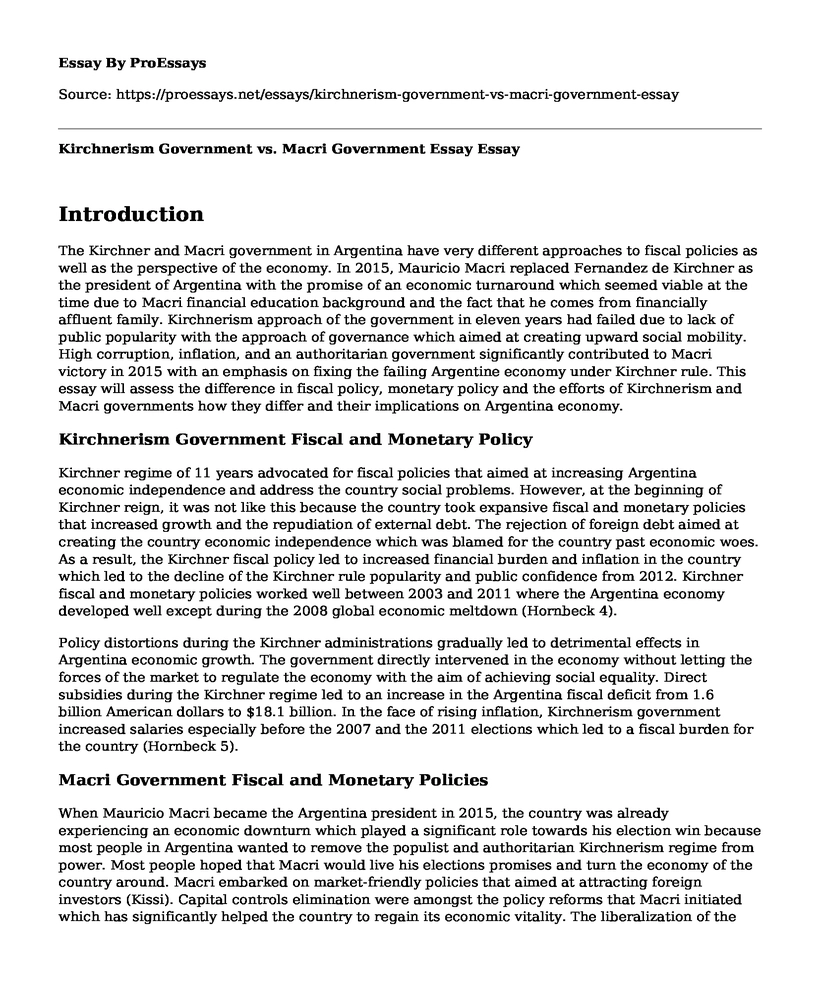Introduction
The Kirchner and Macri government in Argentina have very different approaches to fiscal policies as well as the perspective of the economy. In 2015, Mauricio Macri replaced Fernandez de Kirchner as the president of Argentina with the promise of an economic turnaround which seemed viable at the time due to Macri financial education background and the fact that he comes from financially affluent family. Kirchnerism approach of the government in eleven years had failed due to lack of public popularity with the approach of governance which aimed at creating upward social mobility. High corruption, inflation, and an authoritarian government significantly contributed to Macri victory in 2015 with an emphasis on fixing the failing Argentine economy under Kirchner rule. This essay will assess the difference in fiscal policy, monetary policy and the efforts of Kirchnerism and Macri governments how they differ and their implications on Argentina economy.
Kirchnerism Government Fiscal and Monetary Policy
Kirchner regime of 11 years advocated for fiscal policies that aimed at increasing Argentina economic independence and address the country social problems. However, at the beginning of Kirchner reign, it was not like this because the country took expansive fiscal and monetary policies that increased growth and the repudiation of external debt. The rejection of foreign debt aimed at creating the country economic independence which was blamed for the country past economic woes. As a result, the Kirchner fiscal policy led to increased financial burden and inflation in the country which led to the decline of the Kirchner rule popularity and public confidence from 2012. Kirchner fiscal and monetary policies worked well between 2003 and 2011 where the Argentina economy developed well except during the 2008 global economic meltdown (Hornbeck 4).
Policy distortions during the Kirchner administrations gradually led to detrimental effects in Argentina economic growth. The government directly intervened in the economy without letting the forces of the market to regulate the economy with the aim of achieving social equality. Direct subsidies during the Kirchner regime led to an increase in the Argentina fiscal deficit from 1.6 billion American dollars to $18.1 billion. In the face of rising inflation, Kirchnerism government increased salaries especially before the 2007 and the 2011 elections which led to a fiscal burden for the country (Hornbeck 5).
Macri Government Fiscal and Monetary Policies
When Mauricio Macri became the Argentina president in 2015, the country was already experiencing an economic downturn which played a significant role towards his election win because most people in Argentina wanted to remove the populist and authoritarian Kirchnerism regime from power. Most people hoped that Macri would live his elections promises and turn the economy of the country around. Macri embarked on market-friendly policies that aimed at attracting foreign investors (Kissi). Capital controls elimination were amongst the policy reforms that Macri initiated which has significantly helped the country to regain its economic vitality. The liberalization of the economy and the exchange rate significantly increased investor confidence. The fiscal policies created by Macri administration aimed at reducing government control over the economy such as removing export tariffs and price controls which helped boost the country exports (Kissi). In the recent currency crisis, Macri was able to wither the problem by calling for help from the International Monetary Fund which is a different approach from the previous administration which took over the pension schemes in the country to meet the country financial needs (Fontevecchia). Therefore, Macri has a more liberal fiscal and monetary policy compared to Kirschner administrations.
Conclusion
In conclusion, Kirchnerism government had a more conservative approach that aimed at ending the country dependence on external investors and financial resources. The administration failed to create effective measures to overcome inflation and instead increased salaries which increase the country fiscal burden and cost of living. Macri approach of reducing government control of the market and letting the market forces to play out has significantly worked. Ideally, the government should intervene in the economy where necessary which has worked for the Macri administration fiscal and monetary policies.
Works Cited
Fontevecchia, Agustino. "How Mauricio Macri Ended Argentina's Currency Crisis." Forbes, Forbes Magazine, 25 May 2018, www.forbes.com/sites/afontevecchia/2018/05/25/how-mauricio-macri-ended-argentinas-currency-crisis/#622b06e05daa.
Hornbeck, J. F. "Argentina's post-crisis economic reform: Challenges for US policy." Congressional Research Service, Library of Congress, 2013.
Kissi, Dawn. "Argentina's Macri Puts Bad Days in the Rearview Mirror, but a Familiar Foe Looms." CNBC, CNBC, 3 Sept. 2017, www.cnbc.com/2017/08/31/argentinas-mauricio-macri-puts-bad-days-in-the-rearview-mirror-but-a-familiar-foe-looms.html.
Cite this page
Kirchnerism Government vs. Macri Government Essay. (2022, Aug 23). Retrieved from https://proessays.net/essays/kirchnerism-government-vs-macri-government-essay
If you are the original author of this essay and no longer wish to have it published on the ProEssays website, please click below to request its removal:
- One Belt One Road Initiative Essay
- The Need for Aggiornamento - Essay Sample
- Essay Example on Fashion Merchandising: Success Factors of the Global Market
- Essay Example on UAE and South Korea: Strengthening Diplomatic Relations
- WW1: US Emerges as Superpower After Global Conflict - Essay Sample
- Essay Example on Performance-Based Pay: Merit, Recognition, Incentives & Earnings
- Political Parties: Essential to Parliamentary Democracy - Essay Sample







